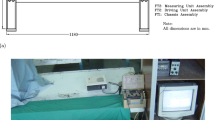Abstract
Fatigue behavior of polycarbonate was investigated to evaluate its potenitial as a material for prosthetic heart valves. Smooth and notched small cantilever specimens were injection molded using various combinations of cylinder and mold temperates. Fatigue testing was conducted in a machine specifically designed to accommodate multipe specimens inliquid environments. Results presented herein are for water immersion. The fatigue lives fell on Weibull distributions with nonzero minimum-life parameters. S-N equations were fitted at constant probabilities of failure; most of these had nonzero fatigue-limit parameters. Polycarbonate fatigue strengths, of notched spcimens particularly, were greatly influenced by cylinder and mold temperatures. Notch sensitivities varied from very low to quite high. These effects were attributed to molecular orientation and residual stresses.
Similar content being viewed by others
References
Schnell, H., Chemistry and Physics of Polycarbonates, Interscience Publishers, New York, N. Y. (1964).
Lazan, B. J. and Yorgiadis, A., “The Behavior of Plastics Under Repeated Stress,” ASTM Special Tech. Publication No. 59, 66–90 (1944).
Lazar, L. S., “Accelerated Fatigue of Plastics,”ASTM Bulletin No. 220, 67–72 (1957).
Zarek, J. M., “Accelerated Fatigue Testing of Polymethyl Methacrylate,”British Plastics,30,399–402 (1957).
Hagerup, E., “Flexural Fatigue Testing of Polyesters,”Jnl. Appl. Polymer Sci.,7 (3),1093–1116 (1963).
“Lexan Polycarbonate Resins Product Data,” General Electric Co., Pittsfield, Mass.
Wolf, L. J. andDiboll, W. B., “Role of Stress Concentation in the Fatigue of Delrin,”Trans. ASME,87,319–322 (1965).
“A Guide for Fatigue Testing and the Statistical Analysis of Fatigue Data,” ASTM Special Tech. Publication No. 91-A (1963).
Johnson, L. G., The Statistical Treatment of Fatigue Experiments, Elsevier Publishing Co., New York, N. Y. (1964).
McEvily, A. J., Boettner, R. C. andJohnston, T. L., “On the Formation and Growth of Fatigue Cracks in Polymers,”in Fatigue-An Interdisciplinary Approach, Syracuse University Press, Syracuse, N. Y., 95–103 (1964).
Hsiao, C. C., “Molecular Orentation-Dependent Fracture Strength,”in Fracture Processes in Polymeric Solids, Interscience Publishers, New York, N. Y., 529–549 (1964).
Ballman, R. L. andToor, H. L., “Orentation in Injection Molding,”Modern Plastics,38,113–124 (1960).
Pringle, O. A. andHarker, R. J., “Environmental Fatigue Testing of Molded Plastic for Prosthetic Heart Valves,”Experimental Mechanics,9 (4),171–178 (1969).
Freudenthal, A. M., “Planning and Interpreatation of Fatigue Tests,” in Symposium on Statistical Aspects of Fatigue, ASTM Special Tech. Publication No. 121, 3–22 (1952).
Freudenthal, A. M. and Gumbel, E. J., “Distribution Functions for the Prediction of Fatigue Life and Fatigue Strength,” International Conference on Fatigue of Metals, Session 3, Paper 5, Inst. Mech. Engrs., London, 1–12 (1956).
Freudenthal, A. M. andGumbel, E. J., “Physical and Statistical Aspects of Fatigue,”Advances in Applied Mechanics, 4, Academic Press, New York, N. Y., 117–158 (1958).
Author information
Authors and Affiliations
Rights and permissions
About this article
Cite this article
Pringle, O.A., Harker, R.J. Effects of molding temperatures on aqueous fatigue behavior of polycarbonate. Experimental Mechanics 11, 507–513 (1971). https://doi.org/10.1007/BF02327690
Issue Date:
DOI: https://doi.org/10.1007/BF02327690




